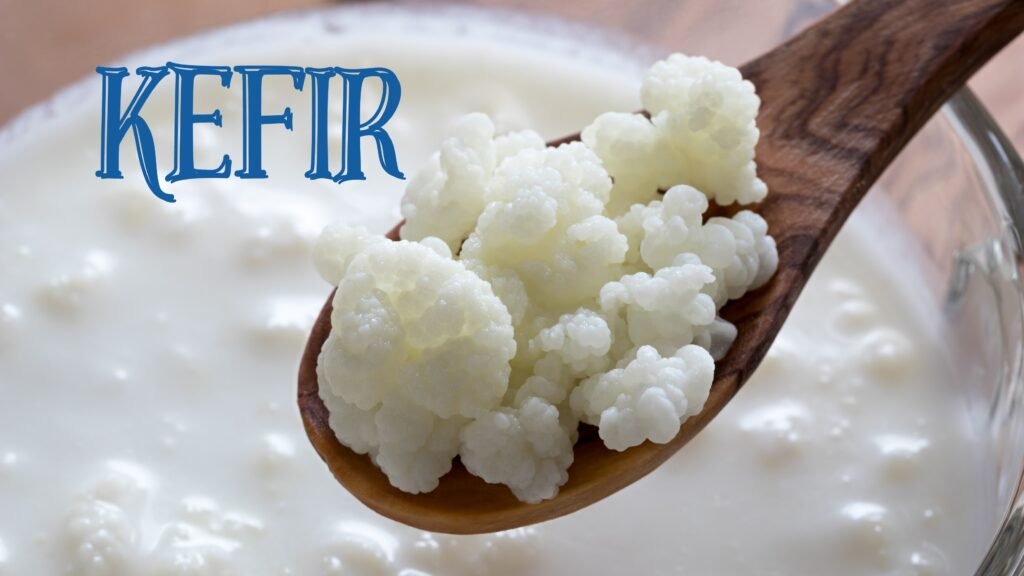
Kefir, a fermented drink made from milk, has been gaining popularity due to its numerous health benefits. This article will answer all your questions about kefir, including what makes it good for you, how much you should consume daily, and whether it’s safe to drink during pregnancy. We’ll also cover how kefir is made and how to tell if it has gone bad. Let’s dive in!
What is Kefir?
Kefir is a tangy, slightly fizzy beverage made by fermenting milk with kefir grains. These grains are not actual grains like wheat or rice but a combination of bacteria and yeast that resemble cauliflower. The fermentation process results in a drink rich in probiotics, which are beneficial bacteria that support gut health.
Why Kefir is Good for You
- Probiotic Powerhouse: Kefir is loaded with probiotics, which help balance the gut microbiota, improving digestion and overall gut health. Probiotics are known to boost the immune system, reduce inflammation, and even improve mental health.
- Nutrient-Rich: Kefir is a good source of essential nutrients, including protein, calcium, vitamin D, and B vitamins. These nutrients are crucial for maintaining bone health, supporting the immune system, and ensuring proper muscle function.
- Digestive Aid: The probiotics in kefir can help alleviate various digestive issues, such as bloating, gas, and constipation. They also play a role in preventing and treating diarrhea.
- Lactose Digestion: Kefir contains enzymes that break down lactose, making it easier to digest for those who are lactose intolerant.
- Antibacterial Properties: Some of the probiotic strains found in kefir, such as Lactobacillus kefiri, can inhibit the growth of harmful bacteria, contributing to a healthier gut microbiome.
How Kefir is Made
Making kefir at home is a simple process that requires only a few ingredients and equipment:
Ingredients:
- Milk (cow, goat, or sheep milk)
- Kefir grains
Equipment:
- A glass jar
- A plastic or wooden spoon
- A breathable cloth or coffee filter
- A rubber band
Steps:
- Prepare the Milk: Pour the desired amount of milk into a glass jar. The quantity of milk depends on how much kefir you want to make.
- Add the Kefir Grains: Add 1-2 tablespoons of kefir grains to the milk. Stir gently with a plastic or wooden spoon.
- Cover the Jar: Cover the jar with a breathable cloth or coffee filter and secure it with a rubber band. This allows the kefir to breathe while keeping contaminants out.
- Ferment: Leave the jar at room temperature for 24-48 hours. The fermentation time depends on your taste preference; longer fermentation results in a tangier flavor.
- Strain the Kefir: After fermentation, strain the kefir into a clean container using a plastic strainer. The kefir grains can be reused for the next batch.
- Store and Enjoy: Store the strained kefir in the refrigerator and enjoy it chilled.
How Much Kefir Should You Drink Per Day?
The amount of kefir you should consume daily can vary based on your health goals and how your body reacts to it. However, a common recommendation is to start with a small amount and gradually increase it.
- Starting: If you’re new to kefir, start with 1/4 to 1/2 cup per day. This allows your body to adjust to the influx of probiotics without overwhelming your digestive system.
- Regular Consumption: Once your body is accustomed to kefir, you can increase your intake to 1 cup per day. This amount is generally sufficient to reap the health benefits of kefir.
- Maximum Limit: While there’s no strict upper limit, it’s best not to exceed 2 cups per day. Consuming too much kefir can lead to digestive discomfort, such as bloating or gas, especially if your body is not used to high levels of probiotics.
Can You Drink Kefir When Pregnant?
Kefir is generally considered safe to drink during pregnancy and can be a beneficial addition to your diet due to its nutrient content and probiotics. However, there are a few considerations to keep in mind:
- Quality and Source: Ensure that the kefir you consume is made from pasteurized milk to avoid the risk of harmful bacteria. Homemade kefir can also be safe if prepared under hygienic conditions.
- Moderation: Stick to moderate consumption, typically 1 cup per day, to avoid any potential digestive discomfort.
- Consult Your Doctor: As with any dietary change during pregnancy, it’s a good idea to consult your healthcare provider before adding kefir to your diet.
Can Kefir Go Bad?
Yes, kefir can go bad, just like any other dairy product. Here are some signs that your kefir may have spoiled:
- Unpleasant Smell: Fresh kefir has a tangy, slightly sour smell. If it has a strong, unpleasant odor, it may be spoiled.
- Taste: Spoiled kefir may taste excessively sour or off. Trust your taste buds; if it doesn’t taste right, don’t drink it.
- Texture: Kefir is naturally thick and slightly effervescent. If it becomes excessively lumpy or has an unusual texture, it may have gone bad.
- Mold: If you see mold growing on the surface or around the container, discard the kefir immediately.
Conclusion
Kefir is a nutritious and beneficial addition to any diet, offering a wealth of probiotics, vitamins, and minerals. It can support gut health, enhance digestion, and boost the immune system. By understanding how much kefir to drink daily, ensuring it’s safe during pregnancy, and knowing how to identify spoiled kefir, you can confidently enjoy this fermented drink.
Remember to start with a small amount, especially if you’re new to kefir, and gradually increase your intake to allow your body to adjust. With its numerous health benefits, kefir can be a valuable part of your daily routine.
Have you tried making kefir at home? Share your experiences and favorite kefir recipes in the comments below! If you’re new to kefir, start today and let us know how it benefits your health.
Read More on What Kefir and Its Health Benefits Are.
Top 5 Health Benefits of Kefir: Discover the Power of this Superfood!



Pingback: Kefir For Digestive Health: How It Helps With IBS | Tasty Tykes